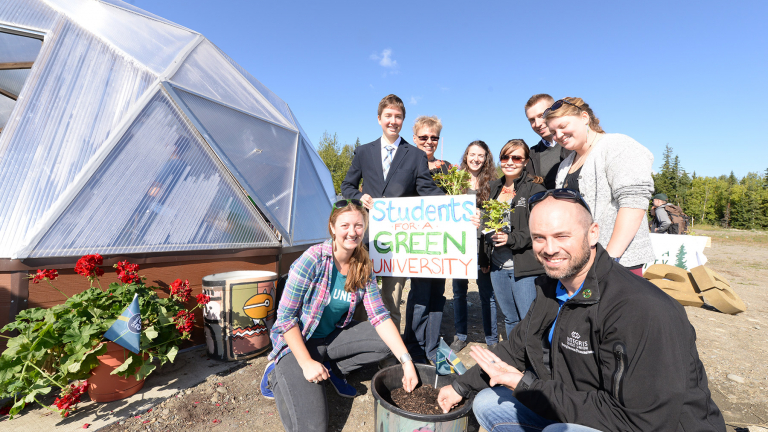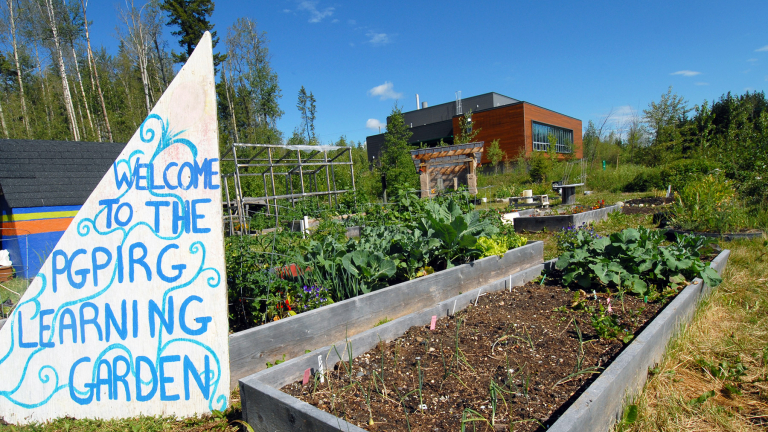Food at UNBC
Food is one of the areas where UNBC is continually improving and showing leadership in Canada. There are many ways to think about food, from the science of growing food or impacts of local and global food systems, to considering nutritional value of food or managing food waste. On this page you will find links to some of our recent achievements related to food, our ongoing work on campus and more broadly, and courses you can take if you want to learn more about food and sustainability.
Food Initiatives on Campus
University Farmers' Market
 The University Farmers' Market (the UFM) is a volunteer-run, weekly market (Tuesdays, 11a.m. - 3p.m.) of local vendors held at the Northern Undergraduate Student Centre (NUSC) Event Space at UNBC. The UFM seeks to promote local sustainability by creating a local market that addresses environmental, economic and social/health issues around food production and locally made products.The University Farmers’ Market is distinguished by its:
The University Farmers' Market (the UFM) is a volunteer-run, weekly market (Tuesdays, 11a.m. - 3p.m.) of local vendors held at the Northern Undergraduate Student Centre (NUSC) Event Space at UNBC. The UFM seeks to promote local sustainability by creating a local market that addresses environmental, economic and social/health issues around food production and locally made products.The University Farmers’ Market is distinguished by its:
- broad, volunteer-driven community of UNBC faculty, students and staff, who work together to promote the common good and to demonstrate a positive approach to sustainability and grassroots change.
- sustainability mandate, guided by a fundamental principle to encourage, promote and support the use of “local” and low-impact practices and lifestyles.
- commitment to promoting local and sustainable food systems on campus and supporting local producers.
Campus Food Strategy Group
 The Campus Food Systems Project is building the student movement to get more local, sustainable food onto university campuses in Canada with support from Meal Exchange. UNBC's Campus Food Strategy Group coordinators Melanie Anderson and Torrye Mckenzie have been busy working on important food initiatives around campus this year. They helped create and now currently maintain the Food Recovery Program, which donates cafeteria leftovers to Saint Vincent de Paul for their meal programs. Melanie is also currently one of the few students across Canada who is working on converting the Real Food Calculator (local food calculator in the USA) into the Canadian framework. Torrye was the student who started the push for UNBC to become a Fair Trade designated campus. She also partnered up with community members to hold UNBC's first Community Kitchen, which was a free event that taught students how to create low cost healthy meals. Melanie and Torrye work very closely with the Green Centre, PGPIRG, SGU, the UFM, Chartwells, and UNBC's faculty and administration. By continuing to bring together a diverse group of stakeholders on campus, they hope to continue to engaged the campus community in a dynamic conversation about food at UNBC.
The Campus Food Systems Project is building the student movement to get more local, sustainable food onto university campuses in Canada with support from Meal Exchange. UNBC's Campus Food Strategy Group coordinators Melanie Anderson and Torrye Mckenzie have been busy working on important food initiatives around campus this year. They helped create and now currently maintain the Food Recovery Program, which donates cafeteria leftovers to Saint Vincent de Paul for their meal programs. Melanie is also currently one of the few students across Canada who is working on converting the Real Food Calculator (local food calculator in the USA) into the Canadian framework. Torrye was the student who started the push for UNBC to become a Fair Trade designated campus. She also partnered up with community members to hold UNBC's first Community Kitchen, which was a free event that taught students how to create low cost healthy meals. Melanie and Torrye work very closely with the Green Centre, PGPIRG, SGU, the UFM, Chartwells, and UNBC's faculty and administration. By continuing to bring together a diverse group of stakeholders on campus, they hope to continue to engaged the campus community in a dynamic conversation about food at UNBC.
Food Waste
Compost
 The composting program at the University of Northern British Columbia began as a joint action between REAPS and PGPIRG in October 1995. This alternative waste management program includes UNBC Food Services, Ground Maintenance, and the campus community. You may have noticed green bins in some hallways when you are making your way around campus? Everyone is welcome to use the green bins to place fruit peels from their lunches, coffee grounds, tea bags, etc. in. These are then collected by PGPIRG volunteers and it is later transported out to our Compost Site by UNBC Facilities staff. By using the green bins, you are helping the composting program reduce the university’s waste disposal costs and this in turn diverts large quantities of organic matter from entering the regional landfill. It also provides an educational facility open to both the university and broader Prince George community. If you have any questions, you can contact PGPIRG at 960-7474, pgpirg@unbc.ca or stop by the office (Rm 6-342).
The composting program at the University of Northern British Columbia began as a joint action between REAPS and PGPIRG in October 1995. This alternative waste management program includes UNBC Food Services, Ground Maintenance, and the campus community. You may have noticed green bins in some hallways when you are making your way around campus? Everyone is welcome to use the green bins to place fruit peels from their lunches, coffee grounds, tea bags, etc. in. These are then collected by PGPIRG volunteers and it is later transported out to our Compost Site by UNBC Facilities staff. By using the green bins, you are helping the composting program reduce the university’s waste disposal costs and this in turn diverts large quantities of organic matter from entering the regional landfill. It also provides an educational facility open to both the university and broader Prince George community. If you have any questions, you can contact PGPIRG at 960-7474, pgpirg@unbc.ca or stop by the office (Rm 6-342).
Waste Audits
Early in the 2014-2015 academic year, a Green Fund Grant was submitted by Art Fredeen (Faculty), Sarah Boyd-Noel (PGPIRG Director), and Michael Watson (NUGSS Sustainability Rep) to audit all the organic waste that is being generated at UNBC's Prince George campus. This proposal was unanimously approved by the Green Fund Sub-Committee and Green University Planning Committee.
What is the premise of this project? With the creation of a new food service system on campus, the organic waste generated was unknown to all stakeholders: students, staff, and faculty. In order to understand how the "All-you-care-to-eat" system affects waste production, primarily with food waste, an audit needed to conducted. The cafeteria is not the only entity being audited for its organic waste. NUGSS food and beverage services, The Thirsty Moose Pub and both Degrees Coffee Co. locations, are also being observed. In the past, aspects of waste and compost have been audited, but there was a missing gap that focused directly on all organic waste generated from these entities on a daily basis, and over specific time intervals.
With this data there is hopes that: 1) food waste can be reduced, 2) consumers will understand how their behaviours directly affect the local campus community, and 3) what size of industrial compost system the Prince George campus would need to handle the amount of organic waste we generate.
Food Production
Geodesic Dome
 The idea for the Geodesic Dome greenhouse started five years ago by a group of students in the club Students for a Green University. Through the hard work of many members of the club, along with UNBC faculty and staff, the dome was designed and funded through many fundraisers and grants, including the Green Fund. The project took four years (and many volunteer hours) for the dome to be built, and the project was proved to be an experiential learning experience as many rules and regulations were negotiated, such as obtaining permits, building a foundation and more. In the summer of 2014 our first dome greenhouse manager, Deanna Rach, coordinated efforts and got the dome built! The idea of the dome greenhouse is that it is a sustainable and organic closed food loop system right here on campus. We grow the produce in the dome, fertilize it using PGPIRG compost, and then send it to the Thirsty Moose Pub to be served to patrons. The whole process takes place right here on campus, minimizing our carbon footprint in food production.
The idea for the Geodesic Dome greenhouse started five years ago by a group of students in the club Students for a Green University. Through the hard work of many members of the club, along with UNBC faculty and staff, the dome was designed and funded through many fundraisers and grants, including the Green Fund. The project took four years (and many volunteer hours) for the dome to be built, and the project was proved to be an experiential learning experience as many rules and regulations were negotiated, such as obtaining permits, building a foundation and more. In the summer of 2014 our first dome greenhouse manager, Deanna Rach, coordinated efforts and got the dome built! The idea of the dome greenhouse is that it is a sustainable and organic closed food loop system right here on campus. We grow the produce in the dome, fertilize it using PGPIRG compost, and then send it to the Thirsty Moose Pub to be served to patrons. The whole process takes place right here on campus, minimizing our carbon footprint in food production.
For updates on the Dome Greenhouse, and other SGU initiatives, visit their Facebook page. Want more information? E-mail SGU.
PGPIRG Sustainability Garden and Rooftop Garden
 If you ever wondered what that garden is doing between the Keyoh residence and the Bioenergy Plant, it is called the PGPIRG Sustainable Learning Garden. The garden exists to demonstrate sustainable gardening techniques for northern climates. The garden space features several raised beds, a new permaculture design, herb spiral, new bean tower, Zen garden with rock sculptures, a cob greenhouse ,and research beds. We grow a whole range of food crops from tomatoes, beets, Swiss Chard and potatoes among many others and it is also home to many different berry bushes. If you need a place to have your morning coffee, eat lunch, play music, learn about gardening, do yoga or just hang out to watch the birds the PGPIRG SLG is the place for you! If you are curious about where your food comes from and would like to harvest some for yourself please contact PGPIRG at 960-7474, pgpirg@unbc.ca or stop by the office (Rm 6-342).
If you ever wondered what that garden is doing between the Keyoh residence and the Bioenergy Plant, it is called the PGPIRG Sustainable Learning Garden. The garden exists to demonstrate sustainable gardening techniques for northern climates. The garden space features several raised beds, a new permaculture design, herb spiral, new bean tower, Zen garden with rock sculptures, a cob greenhouse ,and research beds. We grow a whole range of food crops from tomatoes, beets, Swiss Chard and potatoes among many others and it is also home to many different berry bushes. If you need a place to have your morning coffee, eat lunch, play music, learn about gardening, do yoga or just hang out to watch the birds the PGPIRG SLG is the place for you! If you are curious about where your food comes from and would like to harvest some for yourself please contact PGPIRG at 960-7474, pgpirg@unbc.ca or stop by the office (Rm 6-342).


